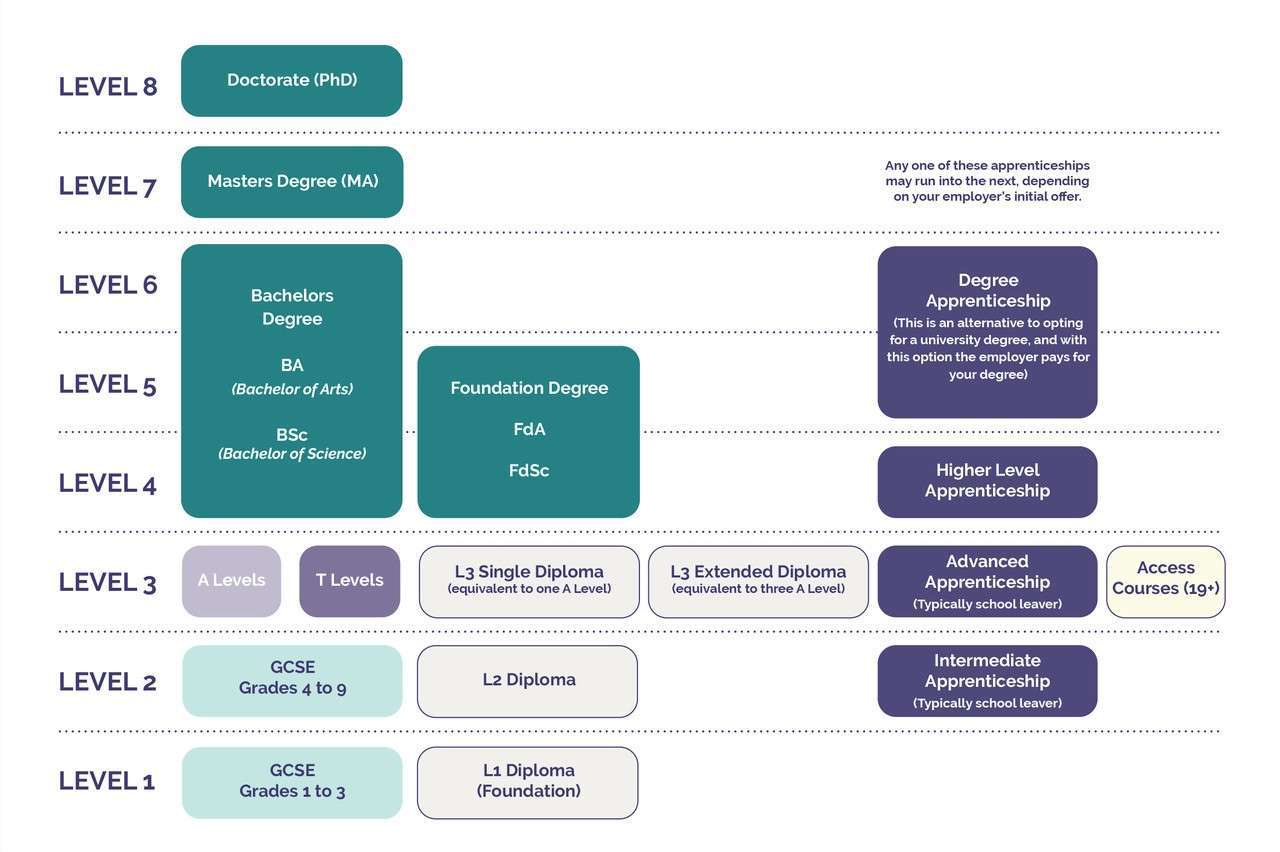What is higher education?
Higher education is the level of education you undertake after you have completed secondary or further education (A levels, T Levels, and BTECs). Some people choose to progress straight to higher education aged 18, while others choose to study higher education later in life. There is no age limit - in fact the oldest HE student in the UK, Archie White, was aged 96 when he graduated!
You might study an HE course at a university, in a further education college or with an online provider.
This table below shows the different levels of qualifications in the UK.

You have a wide range of adult education options available to you, so it’s important to consider the below pathways to see what could be right for you, adult education ranges from evening classes to degrees and everything in between.
First of all, you might want to think about how you want to study? Whether you want to study part-time, full-time, online or in person as these are all possible ways to learn that will help you to achieve your goals.
Access to Higher Education
An ideal starting point if you have GCSEs, Access courses can help you develop the skills and qualifications to progress onto studying for a degree and your future career.
Access courses are a flexible alternative to A Levels and are a recognised qualification for Degree and Higher Education courses.
You can get an Advanced Learner Loan to cover your Access course fees.
Visit our Student Finance Resource for more information.
Degrees & Higher Education
Specialise in your chosen subject area and gain a degree, whether it’s a foundation, undergraduate or postgraduate, you will study for one to six years depending on the subject and chosen way of studying (part time/full time/distance and so on).
These courses will have entry requirements attached to them, so make sure to check you have what you need educationally before applying. It may be that you need to complete Functional Skills in Maths or English or complete an Access course for example to be eligible for that specific course.
Most undergraduate degrees will require level 2 (GCSE or equivalent) and level 3 (A level/BTEC/Access or equivalent) qualifications.
Apprenticeships
These are a great way to earn money whilst you learn and train. Apprenticeships can range from Level 1 through to Level 7, meaning that you can either start with no experience or you can jump in at level 3 for example if you have some previous experience or related education. This means that you can work your way up to obtain a higher or degree level qualification while working and earning.
You can apply to an apprenticeship just like you would a normal job, they are advertised all year round and can be found on job listings websites or the companies own. Locally, a great place to look is here.
Higher and degree apprenticeships (level 4+) will be more sparce in being advertised and in turn this makes them competitive, so make sure you tailor your application to the company, job role and person specification to enhance your chances of being shortlisted.
Check out our Apprenticeships section for more information, resources and case studies.
English for Speakers of Other Languages (ESOL)
Improve your English speaking, reading, and writing with a part time ESOL course.
The ESOL qualification is widely recognised by many employers and will help you progress to further education courses or employment.
GCSEs & Functional Skills
GCSE and Functional Skills courses will help you develop essential skills or improve your GCSE grades.
Courses are usually delivered one day per week and will enable you to progress to further study or develop your career.
Leisure Learning
Learn something new, develop your skills or just have fun with leisure learning courses.
Get creative with courses such as art and cookery or become a DIY genius with practical courses in car maintenance and plumbing.
Courses are delivered by experts and external specialists and are usually facilitated by a local further educational college.
Professional Development
Professional Development courses can help you upskill or retrain.
Teacher and Training Development
Teacher and Training Development courses are focused on improving your skills and confidence as a teacher, coach or mentor.
Frequently Asked Questions
Click the accordions below to expand/collapse the content.
UCAS stands for the ‘University and colleges admissions service’. This is the website where you will find all the information you need about the institutions and courses that are live for the year’s cycle. It is also the platform on which you will use to apply to your chosen course or university. There is a fee involved with you application, this is normal, it’s to help pay the staff who facilitate the service and process applications.
Having said that, if you are applying for ESOL or a leisure learning course for example, you will usually apply to these directly with the provider. So, when you are doing your research, double check on how they want you to apply.
You will have to register for a UCAS Hub account on the website and then you will be able to see and fill in your application. Most sections are simple; however, a few can be harder to complete. For example:
Education: You will need to enter all your qualifications from GCSE’s/O Levels onwards. If you no longer have these certificates, you may need to apply and pay to get another copy.
Finance: This is a drop-down list of how you will finance your course. There will be an option to choose Student Finance England, privately fund and so on. Make sure this is correct. You are entitled to 4 years of student finance so if this is the first time you will be accessing the loan, most will choose this option. However, if you have studied a degree before and have used student finance, it’s worth giving them a call to see what your options are.
There are lots of resources on UCAS that will help you with the application, from video guides to being able to contact them to ask anything.
Visit www.ucas.com
Your personal statement forms one section of the UCAS application. This is the only part of the application where you won’t be taken for face value based on your qualifications or experience. That is why this bit of persuasive writing is so important, it might be the reason a university thinks you’re the right candidate for them. It is limited to 47 lines OR 4,000 characters (whichever one comes first).
They will want to see your motivation and desire to grow and develop academically whilst at university. You will have to demonstrate how your experiences and interests translate into the skills and qualities that you will need to succeed at university.
There are lots of tools out there to help you form your personal statement, why not download our fact sheet and structure sheet to get you started.
A personal statement can be adapted to other forms of education or employment too, it is similar to a covering letter or supporting statement. So, if you are applying to and apprenticeship for example this may also help your application.
There are a few options when it comes to financing a course depending on what you are applying for. Below is a brief outline of what might be available to you or check out this advice from UCAS:
Student Finance England
Available to those studying a full-time undergraduate course providing you meet some basic criteria as below:
- Residency – you’re a UK national or have settled status, normally live in your home country, and have been living in the UK, the Channel Islands, or the Isle of Man for three years before the beginning of your course.
- Your university or college – you’re studying at a recognised publicly-funded university or college (or a private institution studying a course approved for public funding).
- Your course – you’re studying a recognised full-time course e.g. a first degree, a foundation degree, a Higher National Diploma (HND), or an initial Teacher Training course.
- It’s your first higher education course – you can still get some funding if you’ve studied a HE course before, but it will be limited and you’ll have to make up any shortfall.
This will cover your tuition fees and you may be entitled to a maintenance loan to help you with living costs, such as rent and materials for the course. These will have to be paid back once you graduate and you’re earning above a minimum salary.
You have to apply for student finance for each year of your course – not just your first year. This is to guarantee you get the support you’re entitled to throughout your studies.
More information can be found here: https://www.ucas.com/finance/undergraduate-tuition-fees-and-student-loans
Advanced Learner Loan
Available to those who are 19+, studying an eligible course from level 3 up to level 6 at approved course providers, for example you can get this loan when studying on an Access to Higher Education course.
You will apply for this through the student loans company.
Charitable and educational grants and bursaries
Once you’ve applied for student finance and you know how much you’re entitled to in maintenance support, you’ll probably discover a cash shortfall, which you’ll need to make up to cover all your living costs (e.g. accommodation, food, books).
Fortunately, there are extra sources of financial support available in the form of scholarships, bursaries, and grants – we explain the differences between these below. Unlike student loans, you don’t have to pay these back – they’re essentially free money.
But they come with a catch: you need to put some work in to find them. While student loans are available to everyone through student finance, there is no one place to find these extra forms of additional funding and apply. Because scholarships, bursaries, and grants are offered by lots of different providers, they all work a little differently (including who’s eligible, how much is up for grabs, and what you need to do to apply).
This is where it’s over to you to do some research.
You can study, develop, and grow at any age, so returning to education shouldn’t feel like you’re out of your depth. There is plenty of support available to you at most universities and colleges across the UK.
No matter what your journey in education looks like, you can achieve your goals so here is a few pointers to help you along the way.
- Visit some open days and ask the questions that are important to you, even if they don’t relate to the course, there will be a support team who are able to answer your questions. Visit our events page (insert) link to find details of some upcoming open days. To find out about upcoming open days visit our events section.
- See if there are social events for people who are adult learners, people who commute to university etc. This could be entire days, breakfasts or coffee meets.
- There might be specific webinar series’ that you can attend that might be tailored more to your interests if some of the societies seem a little far from your ideal Friday night.
- Speak to other adult learners on Unibuddy and get their advice.
- Are there any online courses available to you like ‘Preparing for University’ or look out for subject specific Summer schools.
- Get in touch with the student union, see if there are opportunities to become a student ambassador or to take on some part time work.
- Look out for student support services and careers services, they will be able to help with any worries/concerns or even help you to make the best job applications possible.
Useful links for adult learners

Hear directly from mature students about what it was like studying for their undergraduate degrees
Mature Student Case studies - UCAS








